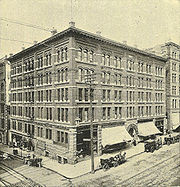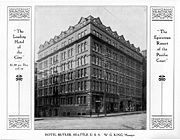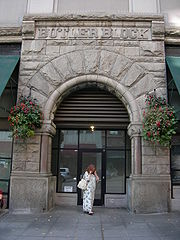
Butler Hotel
Encyclopedia




Prohibition in the United States
Prohibition in the United States was a national ban on the sale, manufacture, and transportation of alcohol, in place from 1920 to 1933. The ban was mandated by the Eighteenth Amendment to the Constitution, and the Volstead Act set down the rules for enforcing the ban, as well as defining which...
era, its Rose Room was repeatedly cited for flouting the laws against the consumption of alcoholic beverages. It closed in 1933; the lower two floors survive as part of the Butler Garage. The building itself is also known as the Butler Block, the name over the main entrance.
One of Seattle's most elegant hotels, the building that was to become the Butler Hotel was built shortly after the Great Seattle Fire
Great Seattle Fire
The Great Seattle Fire was a fire that destroyed the entire central business district of Seattle, Washington, USA, on June 6, 1889.-Early Seattle:In the fall of 1851, the Denny Party arrived at Alki Point in what is now the state of Washington...
. Some years prior, Hillory Butler had owned and operated a truck garden on the quarter-block lot practically center of town and lived there in a small house. One of his conditions for the erection of a major building on his property in 1875 was that it would bear his name in perpetuity. The pre-fire Butler was a three-storey wooden building.
Building plans for the new Butler Block were announced July 3, 1889 in the Seattle Post-Intelligencer
Seattle Post-Intelligencer
The Seattle Post-Intelligencer is an online newspaper and former print newspaper covering Seattle, Washington, United States, and the surrounding metropolitan area...
, less than a month after the fire. Designed by the short-lived partnership of Parkinson and Evers, it was built as an office building, the Phinney and Jones Building, for Guy C. Phinney and Daniel C. Jones. The English
England
England is a country that is part of the United Kingdom. It shares land borders with Scotland to the north and Wales to the west; the Irish Sea is to the north west, the Celtic Sea to the south west, with the North Sea to the east and the English Channel to the south separating it from continental...
-born John Parkinson
The Parkinsons
John B. and Donald D. Parkinson were a father-and-son architectural team operating in Los Angeles in the early 20th century.-Early years:...
of Parkinson and Evers had just arrived in Seattle from Napa, California
Napa, California
-History:The name Napa was probably derived from the name given to a southern Nappan village whose people shared the area with elk, deer, grizzlies and cougars for many centuries, according to Napa historian Kami Santiago. At the time of the first recorded exploration into Napa Valley in 1823, the...
after the fire, and was for several years one of Seattle's leading architects, before moving to Los Angeles
Los Angeles, California
Los Angeles , with a population at the 2010 United States Census of 3,792,621, is the most populous city in California, USA and the second most populous in the United States, after New York City. It has an area of , and is located in Southern California...
after the Panic of 1893
Panic of 1893
The Panic of 1893 was a serious economic depression in the United States that began in 1893. Similar to the Panic of 1873, this panic was marked by the collapse of railroad overbuilding and shaky railroad financing which set off a series of bank failures...
. Seattle neighborhood Phinney Ridge
Phinney Ridge, Seattle, Washington
Phinney Ridge is a neighborhood in north central Seattle, Washington, USA. It is named after the ridge which runs north and south, separating Ballard from Green Lake, from approximately N. 45th to N. 85th Street. The ridge, in turn, is named after Guy C. Phinney, lumber mill owner and real estate...
is named after Phinney, one of the city's leading businessmen of the era. Jones, in contrast was a foulmouthed frontiersman who apparently carried a gun in each hip pocket.
The building was originally five stories. In 1890–1891 a room on the fifth floor served as the meeting room for the Seattle City Council
Seattle City Council
The Seattle City Council is committed to ensuring that Seattle, Washington, is safe, livable and sustainable. Nine Councilmembers are elected to four-year terms in nonpartisan elections and represent the entire city, elected by all Seattle voters....
.
The Butler Block was converted to the Butler Hotel in 1894. Later in that decade, it was the favored hostelry of those who returned wealthy from the Yukon Gold Rush. The hotel soon added its own electric plant and cold storage plant, as well as an open-front refrigerator in its grill room. Two more stories were added in 1903. The Butler became the center of the city's social life; guests included Japanese admiral Tōgō Heihachirō
Togo Heihachiro
Fleet Admiral Marquis was a Fleet Admiral in the Imperial Japanese Navy and one of Japan's greatest naval heroes. He was termed by Western journalists as "the Nelson of the East".-Early life:...
, American politicians William Jennings Bryan
William Jennings Bryan
William Jennings Bryan was an American politician in the late-19th and early-20th centuries. He was a dominant force in the liberal wing of the Democratic Party, standing three times as its candidate for President of the United States...
, Robert M. La Follette, Sr.
Robert M. La Follette, Sr.
Robert Marion "Fighting Bob" La Follette, Sr. , was an American Republican politician. He served as a member of the U.S. House of Representatives, was the Governor of Wisconsin, and was also a U.S. Senator from Wisconsin...
, and William Howard Taft
William Howard Taft
William Howard Taft was the 27th President of the United States and later the tenth Chief Justice of the United States...
, and railroad magnate James J. Hill
James J. Hill
James Jerome Hill , was a Canadian-American railroad executive. He was the chief executive officer of a family of lines headed by the Great Northern Railway, which served a substantial area of the Upper Midwest, the northern Great Plains, and Pacific Northwest...
.
In 1915, apparently in spiteful reaction to the enactment of a state minimum wage
Minimum wage
A minimum wage is the lowest hourly, daily or monthly remuneration that employers may legally pay to workers. Equivalently, it is the lowest wage at which workers may sell their labour. Although minimum wage laws are in effect in a great many jurisdictions, there are differences of opinion about...
law, the Butler fired its maids, replacing them with an entirely Japanese
Japanese people
The are an ethnic group originating in the Japanese archipelago and are the predominant ethnic group of Japan. Worldwide, approximately 130 million people are of Japanese descent; of these, approximately 127 million are residents of Japan. People of Japanese ancestry who live in other countries...
immigrant staff. Two weeks later, under pressure from several directions, the original staff had their jobs restored.
In the Prohibition era, the Butler's Rose Room "became synonymous with the city's informal night life." Victor Aloysius Meyers
Victor Aloysius Meyers
Victor Aloysius Meyers known as "The Clown Prince of Politics" and "The Pagliacci of Politics", was a Seattle, Washington, jazz bandleader and Washington State Democratic Party politician...
—later a Washington State politician—held forth as a bandleader, as did Jackie Souder. The young Bing Crosby
Bing Crosby
Harry Lillis "Bing" Crosby was an American singer and actor. Crosby's trademark bass-baritone voice made him one of the best-selling recording artists of the 20th century, with over half a billion records in circulation....
tried out to sing at the Butler, but was told he needed more experience. John Edmondson Prim, later a founder of the Seattle Urban League and the first African American
African American
African Americans are citizens or residents of the United States who have at least partial ancestry from any of the native populations of Sub-Saharan Africa and are the direct descendants of enslaved Africans within the boundaries of the present United States...
judge in the State of Washington, worked there as a waiter.
For many years, the Butler paid little or no attention to the laws against alcoholic beverages. "Liquor," Seattle businessman Henry Broderick explained decades later, "was not sold by the House, but in some devious, if not exactly mysterious way, whiskey had a habit of arriving at every one of the nearly one hundred tables in the establishment." As Seattlife magazine would comment in 1939, "…it was all in the course of an evening's fun to have the prohibition agents swoop in, seize partially concealed bottles of liquor from under the tables, perhaps arrest an employe (sic) or two, and then depart amid boos and not-too-subtle insults." This went on for roughly a decade, until in early 1929 the Butler was prohibited from allowing dancing after 9 p.m. In May 1929 the Rose Room was ordered closed for a year. When it reopened in 1930, amidst the deepening Great Depression
Great Depression
The Great Depression was a severe worldwide economic depression in the decade preceding World War II. The timing of the Great Depression varied across nations, but in most countries it started in about 1929 and lasted until the late 1930s or early 1940s...
, things were simply not the same.
The Butler closed September 5, 1933. Its contents were auctioned January 15, 1934. All but the bottom two floors were then razed, and a multi-story parking lot erected where the hotel had stood. Not everyone mourned: The Argus
The Argus (Seattle)
The Argus was a longstanding Seattle, Washington weekly newspaper. Founded in February 1894 and published until November 1983, it had a satiric bent and was aligned with the Republican Party. The paper was founded by A. T. Ambrose; six weeks later, Henry Chadwick bought a half interest...
wrote "As a matter of fact the Butler was never a hotel to be especially proud of, although for years the food was considered the best in the city. It was constructed for an office building and later converted into a hotel. It was always a firetrap, and it is a very good thing that it is going the way it is instead of the way it might have gone." Eventually the garage came to be owned by Sam Israel
Sam Israel
Sam Israel was a real estate developer and investor.-Biography:Israel was born in Rhodes, then part of the Ottoman Empire, now part of Greece. He immigrated to the United States in 1919 and became a shoemaker in Seattle, Washington...
and, after his death, the Samis Foundation. The parking garage underwent a major expansion in 2000.

